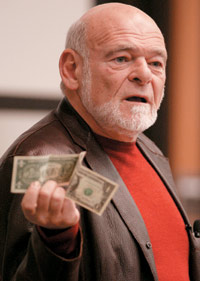| |
 |
| |
Keynote
speaker Sam Zell shows conference attendees what companies
stand to lose if they betray the trust of shareholders. |
| |
|
Kellogg
research centers explore challenge of repairing corporate
image and rebuilding trust after scandals
“Trust
me.” Easy to say, not so easy to earn after a firm loses
the faith of the investing public, according to experts at
a recent Kellogg School conference on financial trust.
Rebuilding
the confidence in financial institutions shattered by corporate
accounting scandals is a necessary step for the United States
to continue to prosper, agreed corporate and academic leaders
who met April 24 and 25 at the Kellogg School’s James
L. Allen Center for the “Conference on Trust in Finance.”
“If
people cannot trust one another, trade, investment and economic
growth will all suffer,” said John Boyd, an economist
who is chair of the finance department at the University of
Minnesota. Boyd said many of the most prosperous nations —
Switzerland, Sweden and the Netherlands — are also those
that score the lowest in corruption.
The conference,
co-sponsored by the Zell
Center for Risk Research and the
Ford Center for
Global Citizenship at Kellogg, examined the
role of financial institutions in building and maintaining
public trust, as well as ways to repair and rebuild that trust
once it has been lost or damaged. “Trust in Finance”
is part of a series of Kellogg conferences that will examine
the economy through the lens of risk management.
“Enron
taught us that you can create an environment that encourages
breaches of trust, but it still comes down to individuals
creating that environment,” said Samuel Zell, chairman
of Equity Group Investments LLC, whose gift established the
Zell Center for Risk Research. “You need consistency
and predictability to create a culture of trust. Predictability
helps generate trust.”
Other
keynote speakers included the Honorable Neil F. Hartigan,
justice of the Illinois Appellate Court; and Charles D. Ellis,
senior adviser with Greenwich Associates. Panelists and attendees
included leaders from business and academia.
Panelist
Barbara Ley Toffler, adjunct professor of management at Columbia
University Graduate School of Business, described a “culture
of denial” that existed at companies such as Arthur
Andersen and that still exists at many companies today, she
said. Toffler said many firms know of potential scandals months
— even years — before they come to the attention
of the public, but choose not to fix them.
“Until
this is addressed broadly across the (accounting) industry,
I don’t think we’re going to see very much change,”
Toffler said.
Toffler
had another message for leaders of financial institutions
who are serious about reform: “Don’t shoot the
messenger. Welcome the people who bring you good information.”
But fixing
trust, Zell said, is no easy feat.
“How
do you fix trust? It’s extraordinarily difficult to
do. There are no simple formulas, primarily because the damage
done is not necessarily definitively measurable.”
Other
speakers offered positive examples for companies to follow.
Jamie Dimon, chairman and CEO of Bank One Corp., gave details
of the turnaround he has led at his company since joining
it almost three years ago.
Among
other things, Dimon has helped the firm fortify its balance
sheet, improve customer service and generally become more
efficient. The company also has instituted strict governance
policies, including the requirement that directors meet twice
a year without management present, and was one of the first
corporations to expense options.
Dimon
also said he makes a practice of sharing the same facts with
everyone who has a stake in Bank One’s future.
“Shareholders,
employees, board members — they all get the same information,”
he said.
—
MG and KR |





